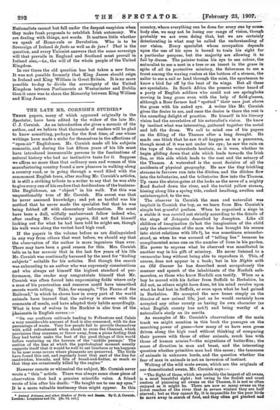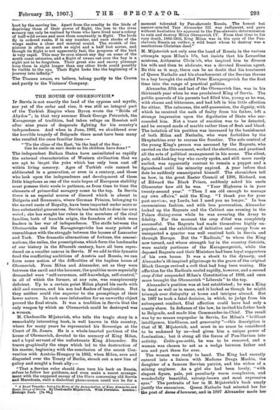THE LATE MR. CORNISH'S STUDIES.*
THESE papers, many of which appeared originally in the Spectator, have been edited by the widow of the late Mr. C. J. Cornish. As an introduction she gives a memoir of the author, and we believe that thousands of readers will be glad to know something, perhaps for the first time, of one whose writings have made a niche for themselves in the affections of "open-air" Englishmen. Mr. Cornish made all his subjects romantic, and during the last fifteen years of his life must have introduced innumerable persons to the fascinations of natural history who had no instinctive taste for it. Suppose we affirm no more than that ordinary men and women of this manufacturing country found a new pleasure in walking along a country road, or in going through a wood filled with the commonest English trees, after reading Mr. Cornish's articles, it is still a striking tribute to a writer to say that he was able to give every one of his readers that desideratum of the business- like Englishman. an "object" in his walk. Yet this was unquestionably true of Mr. Cornish. His secret was that he never assumed knowledge ; and yet so tactful was his method that he never made the specialist feel that he was being fobbed off with elementary information. He must have been a dull, Wilfully unobservant fellow indeed who, after reading Mr. Cornish's papeix, did not find himself looking out for what he bad been told he might see, though
his walk were along the veriest hard high road. - •
If the papers in the Volume before us are distinguished in any way from others that went before, we should say that the observation of the author is more ingenious than ever. There may have been a good reason for this. Mrs. Cornish tells us in her memoir that in the last few years of his life Mr. Cornish was continually harassed by the need for "finding subjects ". suitable for his articles. But though the search was exhausting to an author who was supremely Conscientious and who always set himself the highest standard of per- formance, the reader may congratulate himself that Mr. Cornish was often forced into unpromising fields- where only a man of his penetration and resource could have unearthed secrets worth telling. Take, for example, "The Fauna of the Railroad," in which he shows how in every pa.rt of the world animals have learned that the railway is strewn with the remnants of meals, and have adapted their habits accordingly. What is true of wolves in the Rockiee-is also true of the Pheasants in English covers :-••• "On our southern railroads leading to Folkestone and Calais a very considerable amount of food is also consumed, with its due percentage of waste. Very few people fail to provide themselves with solid refreshment when about to cross the Channel, which provisions they consume, or throw away, from a pious feeling that they had better make the best of the good things of this world before venturing on the horrors of the `middle passage.' The section of the line at which the psychological moment usually suggests itself that it would be well to eat luncheon or tea happens to be near some covers where pheasants are preserved. The birds have found this out, and regularly hunt that part of the line for sandwiches, biscuits, and bits of bread-and-butter, so mush so that they are occasionally killed by the engine."
However remote or whimsical the subject, Mr. Cornish never wrote a " thin " article. There was always some close piece of observation that had a genuine scientific value. A friend wrote of him after his death: "He taught me to use my eyes." It is a more valuable testimony than might appear. In this
• Animal Artisans, and othsr Studios of Birds and Asada By 0,.1. Oorniab. louden Longman and Co. [6s. 6d. net.] country, where everything can be done for every one by some. body else, we may not, be losing our range of vision, though
probably we are even doing that, but we are certainly deteriorating in what may be called the understanding of our vision. Every specialist whose occupation depends upon the use of his eyes is bound to train his sight for a partioular purpose, but the majority are allowing it to fail by disuse. The painter trains his eye to see colour, the naturalist to see a nest in a tree or an insect in the grass in spite of all its protective mimiory, the fisherman to see a trout among the waving rushes at the bottom of a stream, the sailor to see a sail or land through the mist, the sportsman to know a bird far off by the beat of its wings. But all these are specialists. In South Africa the present writer heard of a party of English soldiers who could not see springboks moving in long grass even with the help of field-glasses, although a Boer farmer had " spotted " their ears just above the grass with his naked eye. A writer like Mr. Cornish gives the desire to see, and once the desire is there the rest is the unending delight of practice. He himself in his literary vision had the correlative, of his naturalist's vision. He knew by instinct what was interesting, gathered together the metal and left the dross. We call to mind one of his papers on the filling of the Thames after a long drought. He made one think that he saw it all happen as in a panorama, though most of it was not under his eye; he saw the rain on the tops of the watersheds hesitate, as it were, whether to begin gliding down that side which leads towards the Irish Sea, or this side which leads to the east and the estuary of the Thames. A watershed is the moat decisive of all the accidents of physical geography. He saw the tiny trickling streams in farrows run into the ditches, and the ditches flow into the tributaries, and the tributaries flow into the Thames. Up came the sluice-gates at the locks as the news of a mighty flood flashed down the river, and the turbid yellow stream, biasing along like a spring tide, rushed headlong, swollen and uninterrupted, to the sea.
The observer in Cornish the man and naturalist was implicit in Cornish the boy, as we learn from Mrs. Cornish's
simple but graceful preface. When he organised a siege in'
a stable it was carried out strictly according to the details of the siege of Jotapata described by Josephus. Like all children of imagination (ishot the imagination of the child only the observation of the man who has brought his senses into strict relations with life P), he was sometimes misunder- stood, as when he was accused of "telling lies " because he complimented some one on the number of lions in his garden. His power to express what he observed was manifested in another way in his gift of mimicry. He never listened to a vernacular long without being able to reproduce it. This, of course, does not appear in a book; but in his Nights with an Old Gunner he has described moat scrupulously the manner and speech of the inhabitants of the Norfolk salt- marshes, as those who know Norfolk can testify. When as a boy he moved with his father from Suffolk to Berkshire, he did not, as others might have done, let his mind revolve upon what be had lost in Suffolk, or even upon what he had gained
in Berkshire. He accepted the new home simply as the theatre of new animal life, just as he would certainly have accepted any other county as baying its own character (as what English county has not?) and being worthy of a naturalist's study on its merits.
As examples of Mr. Cornish's observations off the main track we might mention in this book the passages on the marching power of geese—how many of us have seen geese driven along the high road without thinking of comparing their powers with those of other animals, much less with those of human armies P—the migrations of butterflies; the sense of direction in man and beast, and the interesting question whether primitive man bad this sense ; the tameness of animals in unknown lands, and the question whether the fear of man in animals is not an inversion of instinct.
Writing of the wild mute swans, which are the originals of our domesticated swans, Mr. Cornish says :— "The flight of these, which are probably the largest of all swans, is a most beautiful sight ; but owing to the foolish and oruel custom of pinioning all swans on the Thames, it is not so often
enjoyed as it might be. There are now so many swans on the lower reaches of the river that in severe winters they are half
starved ; but as they cannot fly, it is imposaible for the poor birds to move away in search of food, and they often get pinched and
hurt by the moving ice. Apart from the cruelty to the birds of depriving them of their power of flight, the loss. to. the river scenery can only be realised by those who have lived near a colony of half-wild swans and seen them constantly in flight. The birds fly in ordered ranks, if in any number, and each stroke, of the wings makes a clear and musical sound. The stretch of the pinions is often as much as eight and a half feet across, and though its flight is not apparently fast, the progress of the bird is very rapid. This may be seen almost any day on some of the south coast estuaries, and a flight of swans out over the bay is a sight not to be forgotten. Their great size and snowy plumage keep them in sight longer than any other birds could possibly be visible to the eye. Their flight looks like the beginning of a journey into infinity."
The Thames swans, we believe, belong partly to the Crown and partly to the Vintners' Company.











































 Previous page
Previous page